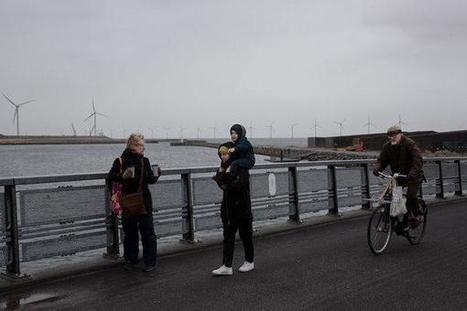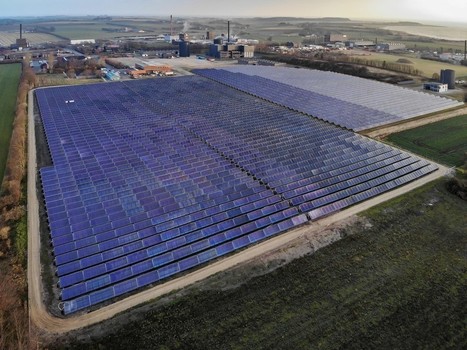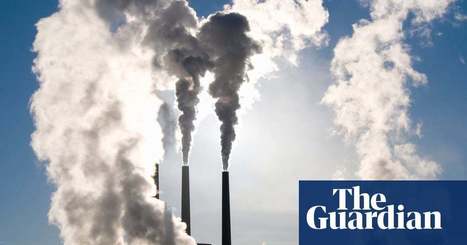 Your new post is loading...

|
Scooped by
Energy Cities
March 27, 2019 3:50 AM
|
The climate emergency, which has been unequivocally proven by scientists, is starting to be an important part of public debates and political and economic decisions. To decarbonize the economy, states and businesses alike must have a clear vision of the long-term trajectory of their territory or sector, and of the necessary changes involved, a vision that must be constructed via a dialogue within society. A long-term outlook serves as a guide for the measures and actions that are required in the short term. The global research network Deep Decarbonization Pathways, coordinated by IDDRI, is publishing a scientific article in Nature Climate Change that proposes a methodology for these actors to adopt.

|
Scooped by
Energy Cities
March 27, 2019 3:22 AM
|
The Danish capital wants to be carbon neutral six years from now. Its plan involves wind, recycling and a very innovative ski hill.

|
Scooped by
Energy Cities
March 25, 2019 3:58 AM
|
Lors du Conseil Métropolitain du vendredi 22 mars 2019, Christian Estrosi, maire de Nice, Président de la Métropole Nice Côte d’Azur, Président délégué de la Région Provence-Alpes-Côte d’Azur, a présenté et arrêté le projet de Plan Climat-Air-Énergie territorial de la Métropole

|
Scooped by
Energy Cities
March 20, 2019 6:15 AM
|
The UK Government has announced plans to end fossil fuel heating systems in new houses from 2025.
The 2019 Spring Statement has announced plans to advance the decarbonisation of gas supplies to reduce dependence on burning natural gases in homes and businesses.
To ensure homes are better for the environment, they will introduce a Future Homes Standard by 2025, so that new build homes are future-proofed with low-carbon heating and world-leading levels of energy efficiency.

|
Scooped by
Energy Cities
March 20, 2019 5:54 AM
|
With elections in May, the balance of opinion in Parliament is a climate policy risk factor on the minds of many in Brussels. The national draft 10-year energy plans, just in to the Commission, project widespread growth in costlier renewables. But populists who see climate as a globalist rather than nationalist-first agenda may prove hard to bring on side with an expensive and disruptive transition. The public will be influenced by climate awareness, leadership and their wallets. The EU’s efficiency-first programme won’t be enough in the long term but while it’s delivering savings there’s a chance to use that to support real decarbonisation.

|
Scooped by
Energy Cities
March 20, 2019 3:51 AM
|
Cutting energy use in buildings, ramping up renewable electricity and developing large-scale storage with hydrogen are clear options in bringing energy emissions down to zero by 2050, according to a new study published on Thursday (14 March).

|
Scooped by
Energy Cities
March 13, 2019 3:41 AM
|
A draft energy and climate law due to be presented to French cabinet ministers on Monday has been postponed so that it can be reworked with more ambitious environmental goals, President Emmanuel Macron's office said on Sunday.
The proposals had been criticised by climate change campaigners and a high-level state-backed economic affairs committee for being too vague on some targets, including an aim for France to be "carbon neutral" by 2050.

|
Scooped by
Energy Cities
March 13, 2019 3:24 AM
|
Amager Bakke burns garbage to provide heat and electricity to Copenhagen, but it smells just fine.

|
Scooped by
Energy Cities
March 13, 2019 3:10 AM
|
The UK government is finally acknowledging that we need to do something about decarbonising heat (roughly 50% of global energy use and 39% of CO2 emissions). There has been a lot in the press about this recently including the obvious measures around better insulation and some lovely infographics wit

|
Scooped by
Energy Cities
March 12, 2019 12:58 PM
|
The European gas industry is on the cusp of a green revolution similar to the one that took place in the electricity sector, with a greater variety of low-carbon gases feeding into the grid at the local level, says Jean-Marc Leroy.

|
Scooped by
Energy Cities
March 12, 2019 12:51 PM
|
In December 2018, EU legislators hammered out a political agreement on a new energy market design. As the dust settles, it’s time to determine whether all Europeans will have the tools to become ac…

|
Scooped by
Energy Cities
March 6, 2019 4:21 AM
|
As EU leaders prepare to debate the European Commission’s proposal to reach net-zero emissions by 2050, most eyes will again be on Poland, writes Brook Riley.

|
Scooped by
Energy Cities
March 6, 2019 2:41 AM
|
Top business leaders believe that the transition to a climate neutral economy will create new opportunities for Europe. As EU energy and environment ministers meet in the coming days, they must realise this and adopt policies for the long-term, writes Eliot Whittington.
|

|
Scooped by
Energy Cities
March 27, 2019 3:46 AM
|
Ignoring the energy transition is a threat to the climate, but will also undermine the ability of companies to hire the best talent and attract future clients, argues Helene Egebøl, CEO of Schneider Electric Denmark

|
Scooped by
Energy Cities
March 27, 2019 3:20 AM
|
Around 75% of coal production is more expensive than renewables, with industry out-competed on cost by 2025

|
Scooped by
Energy Cities
March 21, 2019 11:30 AM
|
The 2010s proved to be a breakthrough decade for climate policy at the global and European level. Growing awareness of the scale of risk associated with anthropogenic climate change, coupled with the decreasing cost of a number of low-carbon energy technologies, contributed to an increased acceptance of transition. At the same time, following the failed climate summit in Copenhagen, the rules of international cooperation to protect the climate underwent a deep transformation. The Paris Agreement created a new global climate policy framework, based on a gradual, bottom-up increase of ambitions in individual countries and regions.

|
Scooped by
Energy Cities
March 20, 2019 5:55 AM
|
New report showing that fossil-free energy systems in Europe by 2050 are feasible in different configurations and can come with benefits from a socio-economic point of view compared to a current policies baseline.

|
Scooped by
Energy Cities
March 20, 2019 5:41 AM
|
An ordinance passed unanimously directs the city manager to transition from carbon-producing energy sources by the end of 2020.

|
Scooped by
Energy Cities
March 13, 2019 4:04 AM
|
Ørsted’s transformation from a fossil-intensive European utility to a leading global renewable energy company has benefited the company’s bottom line as well as the climate, writes Jakob Askou Bøss, Head of Strategy and Communication

|
Scooped by
Energy Cities
March 13, 2019 3:39 AM
|
Does decarbonisation inevitably mean de-industrialisation?

|
Scooped by
Energy Cities
March 13, 2019 3:12 AM
|
Government advisers suggest homes are heated using low-carbon energy instead

|
Scooped by
Energy Cities
March 12, 2019 12:59 PM
|
As the European Union turns the page on a series of clean energy laws focused on electricity, attention is now turning to decarbonisation in the gas sector, with an upcoming gas package expected in 2020. And the power sector intends to play a central role there too.

|
Scooped by
Energy Cities
March 12, 2019 12:56 PM
|
Reaching net-zero emissions means not only decarbonising the electricity system but the whole energy system. And Carbon Capture and Storage (CCS) will be necessary to achieve that, writes Guloren Turan.

|
Scooped by
Energy Cities
March 6, 2019 5:02 AM
|
According to the annual Carbon Disclosure Project report, only one in three firms have climate goals set to go beyond 2025. Arthur Neslen explains in an article in The Guardian. How concerned should we be? Majority of European firms have no CO2 reduction targets Most European companies have no target for reducing their greenhouse…

|
Scooped by
Energy Cities
March 6, 2019 3:24 AM
|
The overall aim of the EU-SysFlex project is to provide a roadmap for Europe in meeting the challenge of integrating 50% renewables by 2030.
Europe has ambitious plans to become greener and more decarbonized by increasing levels of renewable energy and implementing energy efficiency measures. Today, electrical energy accounts for approximately 20% of energy consumption in Europe and is predicted to rise to 40% by 2050. Further, in 2030, it is expected that at least 50% of the European electricity system will comprise of renewable energy sources (RES).
|
 Your new post is loading...
Your new post is loading...


































